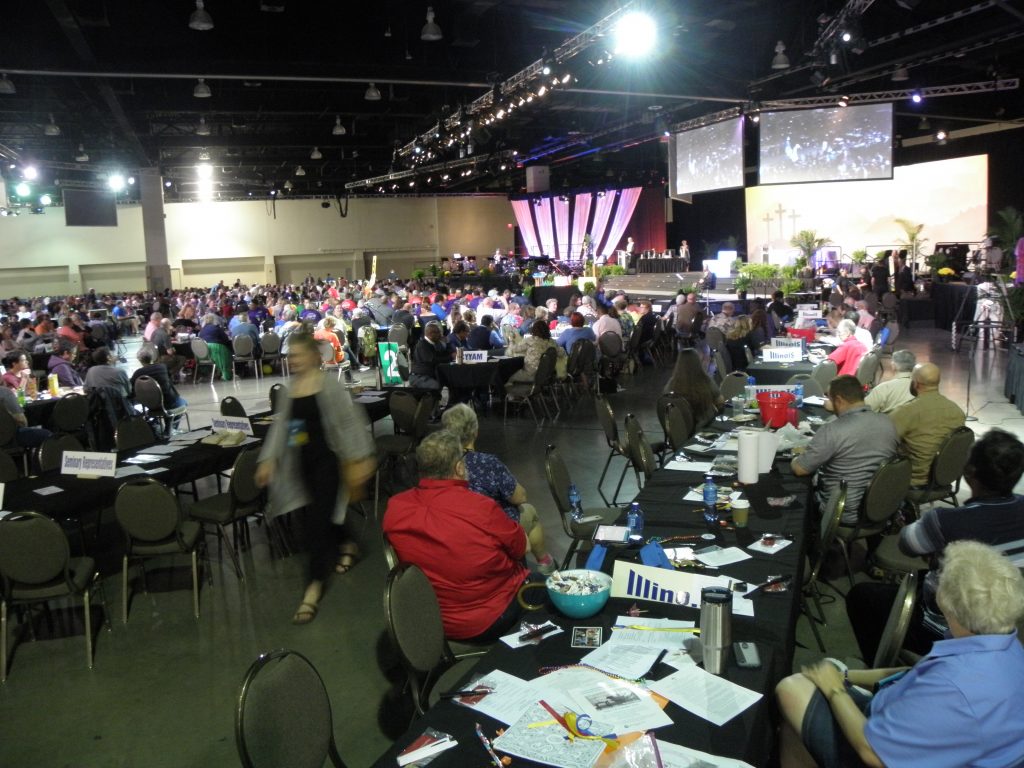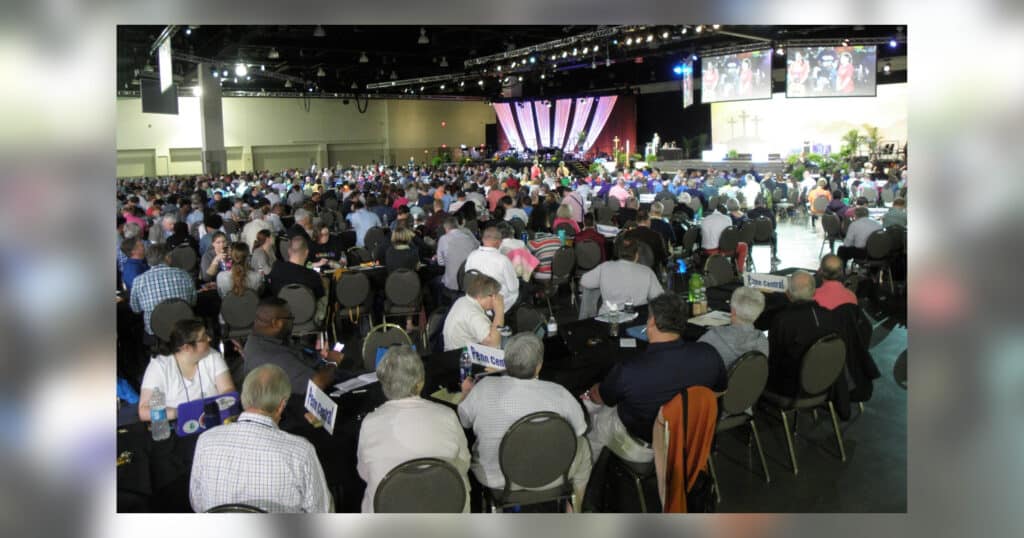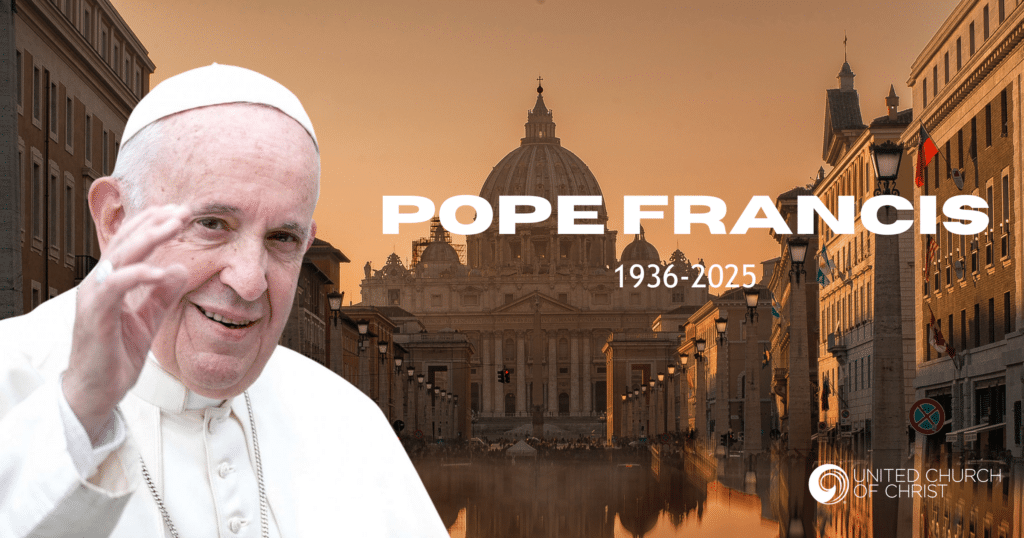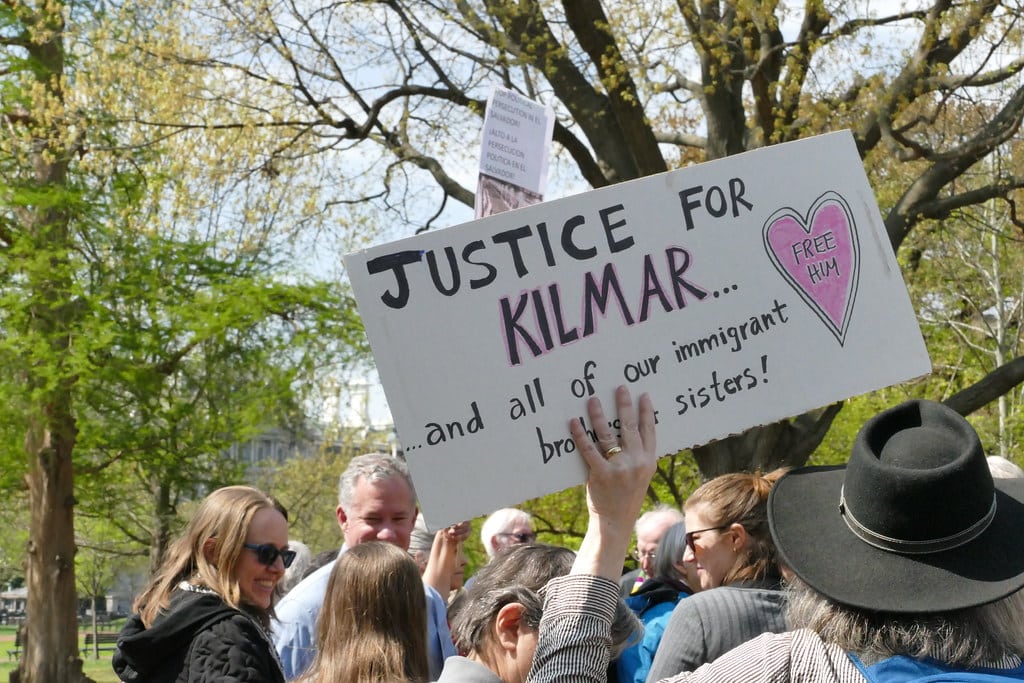UCC Board proposes, in detail, that Synod meet every 3 years instead of every 2
The General Synod of the United Church of Christ will be held every three years instead of every two, if a new recommendation from the UCC Board is approved by next year’s Synod.
The recommendation came in an Oct. 21 vote of the Board during its fall meeting, held online. It was the product of months of work by a special Task Force on General Synod Frequency, Form and Function, formed in 2020 and composed of Board members.
If two-thirds of the delegates to next summer’s 34th General Synod approve, the new schedule will take effect after the 35th General Synod in 2025. The 36th Synod would thus be held in 2028, changing a pattern of biennial meetings since the denomination’s founding in 1957.
The recommendation consists of detailed changes to the UCC Bylaws. These would alter the Synod’s frequency, or “term,” but that’s not all. They would also address the domino effect the change would have on term lengths of delegates, officers of the church, Board members and more. The Governance Committee of the Board fashioned the proposed amendments with help from UCC General Counsel Heather Kimmel.

‘Question of stewardship’
The Rev. John Dorhauer, general minister and president, called how often Synod meets “a question of stewardship.”
“The cost to both our budget and our staff time is no longer, I believe, a reasonable ask,” he told UCC News. “When every dollar has to serve mission and create value, we can’t afford the cost of doing Synod every two years.”
The cost of the last in-person General Synod, in 2019, was already over $1 million. And while costs of the 2023 Synod in Indianapolis are still being detailed, they are not expected to be lower. As an example, Dorhauer described just one convention-center line item. “In 2019 in Milwaukee, we paid $20,000 for WiFi,” he said. “In 2023 we will pay $102,000.”
In addition to dollar costs, Dorhauer said, “too many staff put programmatic work for which they were called here to serve on hold in the six months prior to Synod,” he said. “It has become a literal all-hands-on-deck production and for about half a year their actual work takes a back seat to preparing for Synod.”
History of frequency debates
It is not a new topic. The Executive Council — a forerunner of the UCC Board — proposed a study of Synod frequency in the mid-1970s. The 1977 General Synod rejected it and voted the opposite: that the Synod “continue to meet biennially.”
The 1977 delegates said biennial meetings over the first 20 years of the UCC’s life had “proven to be a valuable vehicle for resourcing the whole church, enabling and educating the total ministry, enriching the fellowship, and coming to terms with the issues of the day.”
Subsequent proposals to reduce Synod frequency — including those in 2003, 2011 and 2015 — also failed.
‘New rhythm and pattern’
Yvette Wynn mentioned that history in 2021. As chair of the UCC Board at the time, she reported on the work of the frequency committee she had formed in 2020, with support from Dorhauer and the Board.
“Conversations about both the format and frequency of GS have continued to surface through the years,” Wynn wrote in May 2021. “…Rising costs have outpaced national setting budget to host GS; time commitment of national staff and other covenantal partners to plan and deliver GS at the level we have come to expect means that other areas of ministry may not be addressed with the same turnaround during the planning cycle.”
“The frequency of General Synod has been a subject of discussion for many years because of the significant cost associated with the event and a growing perception that our conventional ways of gathering as a church are no longer meeting our spiritual needs,” said the Rev. Cameron Barr, current Board chair. “While this subject has arisen on numerous occasions in the past, the pandemic experience has convinced us that new possibilities are emerging.
“The greatest hurdle was not reaching agreement that this was the right path forward — Board members and the Council of Conference Ministers were all in general agreement that now is the time to seek a new rhythm and pattern for our national meetings. But the devil was in the details. What would this mean for terms of service? How would this affect the resolution process? What unexpected consequences should we think about?”
He credited the task force led by Wynn, the Governance Committee, led by the Rev. Marsha Williams, and Kimmel for their work “to find the right solutions to these questions.”

Election-cycle amendments
The new proposal’s level of detail is where it differs from perhaps all past ones. Kimmel said the full text of the proposed changes will be posted soon at the General Synod website — and circulated in other ways — along with an explanatory document in a “frequently asked questions” style.
But the proposal’s key bylaw amendments include:
- Calling for biennial Synods “until the close of the 2023 General Synod term in 2025. Regular meetings shall be held triennially beginning in 2025. …”
- Changing the word “biennium” in numerous Synod-related references to “General Synod term.”
- Keeping two General Synods as the term of general minister and president and of each associate general minister. But the number of times such officers could be reelected would decrease from two to one. That means the current maximum tenure of any such officer — 12 years — would not change.
- Keeping three General Synods as the “term” of the UCC Board and the General Synod Nominating Committee — meaning members of those bodies would serve nine years.
- Leaving it to other delegate-sending bodies — such as Conferences, historically underrepresented groups, and councils — to best organize themselves to manage the change.
‘Work of art’
Dorhauer called those election-cycle details “the biggest stumbling blocks” in trying to fashion a triennial Synod. He commended how Kimmel and the Board’s Governance Committee addressed them.
“About a month before the Board meeting, I got a first look at the proposed new bylaws,” Dorhauer said. “It was, as I described it to the Board, a work of art – not a term usually applied to a set of very technical aspects of our bylaws. It was imaginative and creative and brilliant – and resolved what for many was the biggest stumbling block to gaining support for this move.”
“In the end, there seems to be universal agreement that the hurdles to a new pattern of General Synod meetings can be overcome,” Barr said. “We hope that the General Synod will prayerfully consider this proposal next summer. It reflects prayerful and painstaking work, and we truly believe it’s in service to our mission to gather as the Body of Christ.”
Content on ucc.org is copyrighted by the National Setting of the United Church of Christ and may be only shared according to the guidelines outlined here.
Related News
UCC GMP Releases Statement on Pope Francis
“… he will wipe every tear from their eyes.Death will be no more;mourning and crying and...
Read MoreUCC churches and faith communities join in protest of political prisoner
Members of Washington, D.C. area United Church of Christ congregations joined with other faith...
Read MoreMy Country ‘Tis of Thee
Lately, there has been much conversation about immigration policies in the United States. The...
Read More



